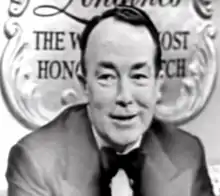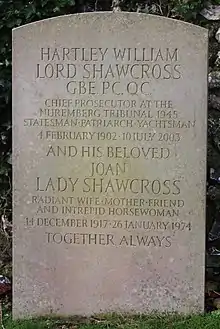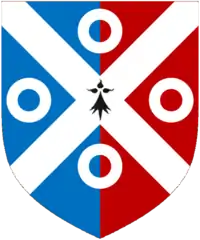Hartley Shawcross
Hartley William Shawcross, Baron Shawcross, GBE, PC, QC (4 February 1902 – 10 July 2003), known from 1945 to 1959 as Sir Hartley Shawcross, was an English barrister and Labour politician who served as the lead British prosecutor at the Nuremberg War Crimes tribunal. He also served as Britain's principal delegate to the United Nations immediately after World War II and as Attorney General for England and Wales.
The Lord Shawcross | |
|---|---|
 Hartley Shawcross being interviewed in 1954 | |
| President of the Board of Trade | |
| In office 24 April 1951 – 26 October 1951 | |
| Prime Minister | Clement Attlee |
| Preceded by | Harold Wilson |
| Succeeded by | Peter Thorneycroft |
| Attorney General for England and Wales | |
| In office 4 August 1945 – 24 April 1951 | |
| Prime Minister | Clement Attlee |
| Preceded by | Sir David Maxwell Fyfe |
| Succeeded by | Sir Frank Soskice |
| Member of Parliament for St Helens | |
| In office 5 July 1945 – 12 June 1958 | |
| Preceded by | William Albert Robinson |
| Succeeded by | Leslie Spriggs |
| Member of the House of Lords Lord Temporal | |
| In office 14 February 1959 – 10 July 2003 Life peerage | |
| Personal details | |
| Born | Hartley William Shawcross 4 February 1902 Giessen, German Empire |
| Died | 10 July 2003 (aged 101) Cowbeech, East Sussex, England |
| Nationality | British |
| Political party | Labour (before 1959) |
| Other political affiliations | Crossbencher (1959–2003) |
| Spouse(s) | Alberta Rosita Shyvers
(m. 1924; died 1943)Joan Winifred Mather
(m. 1944; died 1974)Susanne Monique Huiskamp
(m. 1997) |
| Children | 3 (by Mather; including William) |
| Education | Dulwich College |
| Alma mater | |
| Awards | Knight Bachelor (1945) |
Early life
Hartley William Shawcross was born in Giessen, Germany, to British parents, John and Hilda Constance (Asser) Shawcross, while his father was teaching English at Giessen University. He attended Dulwich College, the London School of Economics and the University of Geneva and read for the Bar at Gray's Inn, where he won first-class honours.
Career
He joined the Labour Party at a young age and served as Member of Parliament for St Helens, Lancashire from 1945[1] to 1958, being appointed to be Attorney General in 1945[2] until 1951. It was in 1946 when debating the repeal of laws against trade unions in the House of Commons that Shawcross allegedly said "We are the masters now",[3] a phrase that came to haunt him.
He was knighted in 1945 upon his appointment as Attorney-General[4] and named Chief Prosecutor for the United Kingdom at the Nuremberg Trials.
Nuremberg Trials
Shawcross's advocacy before the Nuremberg Trial was passionate. His most famous line was: "There comes a point when a man must refuse to answer to his leader if he is also to answer to his own conscience".
He avoided the crusading style of American, Soviet and French prosecutors. Shawcross's opening speech, which lasted two days, the 26 and 27 July 1946, sought to undermine any belief that the Nuremberg Trials were victor's justice (an exacted vengeance against defeated foes). Instead, he focused on the rule of law and demonstrated that the laws that the defendants had broken, expressed in international treaties and agreements, were those to which prewar Germany had been a party. In his closing speech, he ridiculed any notion that any of the defendants could have remained ignorant of the thousands of Germans exterminated because they were old or mentally ill. He used the same argument for the millions of other people "annihilated in the gas chambers or by shooting" and maintained that each of the 22 defendants was a party to "common murder in its most ruthless forms".[5][6]
Attorney-General and UN Factotum
As Attorney-General, he prosecuted William Joyce ("Lord Haw-Haw") and John Amery for treason, Klaus Fuchs and Alan Nunn May for giving atomic secrets to the Soviet Union, and John George Haigh, known as 'the acid bath murderer'.
From 1945 to 1949, he was Britain's principal delegate to the United Nations and was involved in the official adoption of the UN flag in 1946,[7] but he was recalled in 1948 to lead for the government's interest at the Lynskey tribunal. In 1951, he briefly served as President of the Board of Trade until the Labour government's defeat in the election of that year.
Shawcross left his name to a Parliamentary principle, in a defense of his conduct regarding an illegal strike, that the Attorney-General "is not to be put, and is not put, under pressure by his colleagues in the matter" of whether or not to establish criminal proceedings.[8][9]
Return to opposition
Shawcross ended his law career in 1951, the same year as the defeat of the second Attlee ministry. He was expected to become a Tory, earning him the nickname "Sir Shortly Floorcross" but instead he remained true to his Labour roots.
During the committal hearing for the suspected serial killer doctor John Bodkin Adams in January 1957, he was seen dining with the defendant's suspected lover, Sir Roland Gwynne (Mayor of Eastbourne from 1929–31), and Lord Goddard, the Lord Chief Justice, at a hotel in Lewes.[10] The meeting added to concerns that the Adams trial was the subject of concerted judicial and political interference.
Shawcross resigned from Parliament in 1958, saying he was tired of party politics.
Elevation
Shawcross was made one of Britain's first life peers on 14 February 1959 as Baron Shawcross, of Friston in the County of Sussex,[11] and sat in the House of Lords as a crossbencher.
Defending press freedom
In 1961 he was appointed the chairman of the second Royal Commission on the Press. In 1967 he became one of the directors of The Times responsible for ensuring its editorial independence. He resigned on being appointed chairman of the Press Council in 1974. From 1974 to 1978 he was chairman of the Press Council and is described as "forthright in his condemnation both of journalists who committed excesses and of proprietors who profited from them" and as a "doughty defender of press freedom".[12]
Later years
In October 1974 he poured scorn on a Labour Party pamphlet that recommended the application of "internal democracy" to editorial policy, saying "This means that... there would be some sort of committee consisting at the best of a mixture of van drivers, press operators, electricians and the rest, with no doubt a few journalists, but more probably composed of trade union officials, to deal with editorial policy."[12]
In the 1974 New Year Honours Lord Shawcross was appointed a Knight Grand Cross of the Order of the British Empire (GBE).[13]
Philanthropy and awards
In 1957, he was among a group of eminent British lawyers who founded JUSTICE, the human rights and law reform organisation and he became its first chairman, a position he held until 1972. He was instrumental in the foundation of the University of Sussex and served as chancellor of the university from 1965-85.
He was the President of the charity Attend[14] (then National Association of Leagues of Hospital Friends) from 1962–72.
Personal life
Lord Shawcross was married three times. His first wife Alberta Rosita Shyvers (m. 24 May 1924) suffered from multiple sclerosis and committed suicide on 30 December 1943.
His second wife Joan Winifred Mather (m. 21 September 1944) died in a riding accident on the Sussex Downs on 26 January 1974.
His second wife gave birth to two sons, the author and historian William Shawcross and Hume Shawcross, and a daughter, Dr Joanna Shawcross.
At the age of 95 he married Susanne Monique (née Jansen), formerly wife of Gerald B. Huiskamp,[15] on 18 April 1997 in Gibraltar.
He died at home at Cowbeech, East Sussex, at the age of 101. Lady Shawcross died on 2 March 2013.[16]
He is buried in the churchyard at Jevington in Sussex.

From 1947 to 1960 he was the owner of Vanity V, a 12-metre class racing yacht designed by William Fife to the Third International Rule, built in 1936, which he kept at his home in Cornwall.[17] A later skipper of the boat, John Crill, recalls being told[17] that Lord Shawcross, "when the election was due in about 1951, had Vanity V repainted with a vast 'Vote Labour' banner all the way along her topsides".
Coat of arms
  |
|
References
- "No. 37238". The London Gazette. 24 August 1945. p. 4294.
- "No. 37222". The London Gazette. 14 August 1945. p. 4135.
- This is the wording usually quoted, and is attested by eyewitness Lord Bruce in a New Statesman article, but it is still a matter of dispute. For full details see Wikiquote, Hartley Shawcross, Baron Shawcross.
- "No. 37243". The London Gazette. 28 August 1945. p. 4345.
- "NAZIS LEADERS LOSING HOPE". Examiner (Launceston, Tas. : 1900 - 1954). 29 July 1946. p. 1. Retrieved 3 January 2020.
- Trial of the Major War Criminals Before the International Military Tribunal. 19. 1946. pp. 432–528.
- "United Nations Flag Approved by General Assembly's Legal Committee". United Nations Photo.
- Shawcross, Hartley (29 January 1951). "Prosecutions (Attorney-General's Responsibility)". Hansard. House of Commons Debates (c681).
- Heintzman, Ralph (16 May 2020). "The real meaning of the SNC-Lavalin affair". The Globe and Mail Inc.
- Cullen, Pamela V. (2006). A Stranger in Blood: The Case Files on Dr John Bodkin Adams. London, UK: Elliott & Thompson. ISBN 978-1-904027-19-5.
- "No. 41637". The London Gazette. 17 February 1959. p. 1164.
- "Obituaries: Lord Shawcross". The Telegraph. 11 July 2003. Retrieved 17 July 2011.
- "No. 46162". The London Gazette (Supplement). 1 January 1974. p. 7.
- "Attend VIPs | Attend".
- Burke's Peerage 1999, vol. 2, p. 2594
- "Peerage News: The Baroness Shawcross". 6 March 2013.
- "Vanity V". Classic Yacht Info.
Bibliography
- Shawcross, H. (1995). Life Sentence. London: Constable. ISBN 978-0-09-474980-1.
External links
 Quotations related to Hartley Shawcross at Wikiquote
Quotations related to Hartley Shawcross at Wikiquote- Hansard 1803–2005: contributions in Parliament by Hartley Shawcross
- Portraits of Hartley Shawcross at the National Portrait Gallery, London

- Obituary, The Independent, 11 July 2003 by James Morton
- A film clip "Longines Chronoscope with Sir Hartlety [sic] Shawcross" is available at the Internet Archive
- Appearance on Desert Island Discs (7 July 1991)
- Newspaper clippings about Hartley Shawcross in the 20th Century Press Archives of the ZBW
| Parliament of the United Kingdom | ||
|---|---|---|
| Preceded by William Albert Robinson |
Member of Parliament for St Helens 1945–1958 |
Succeeded by Leslie Spriggs |
| Legal offices | ||
| Preceded by Sir David Maxwell Fyfe |
Attorney General for England and Wales 1945–1951 |
Succeeded by Sir Frank Soskice |
| Political offices | ||
| Preceded by Harold Wilson |
President of the Board of Trade April–October 1951 |
Succeeded by Peter Thorneycroft |
| Media offices | ||
| Preceded by Edward Pearce |
Chairman of the Press Council 1974–1978 |
Succeeded by Patrick Neill |
| Honorary titles | ||
| Preceded by The Lord Balfour of Inchrye |
Senior Privy Counsellor 1988–2003 With: The Earl of Listowel (1988–1997) |
Succeeded by The Duke of Edinburgh |
| Preceded by The Lord Shackleton |
Senior life peer 1994–2003 |
Succeeded by The Lord Chalfont |
.svg.png.webp)